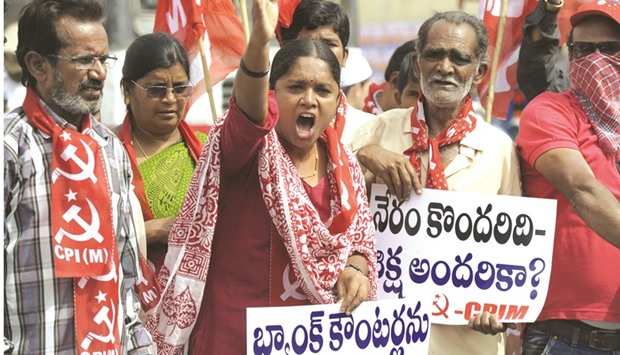The government yesterday announced a slew of measures to deal with a cash shortage brought on by its decision to abolish high-denomination currency notes.
India’s highest denomination Rs500 and Rs1,000 notes ceased to be legal tender from Wednesday as part of a government crackdown against “black money,” or untaxed money and counterfeit currency used for financing terrorism.
The Finance Ministry held a review meeting to tackle the situation as ATM machines were taken offline to be recalibrated to disburse the new currency and banks were overrun with desperate customers, some of whom queueing for up to seven hours to exchange currency.
From Thursday to Sunday, banks had collected Rs3tn worth of the higher denomination notes and had managed to distribute only Rs500bn.
Finance Secretary Shaktikanta Das said mobile banking vans and banking correspondents – banking representatives offering financial services outside bank branches – would fan around rural areas to distribute small denomination notes, and new micro cash machines would be used all over the country to disburse cash.
Banks had been asked to arrange for separate queues for senior citizens and people with disabilities, Das said.
It had been announced on Sunday that the old currency notes could be used at petrol stations, hospitals and to pay utility bills for another 10 days till November 24.
Daily limits on the amounts that could be exchanged per person at banks or withdrawn from banks and ATMs have been increased, Das said.
Recalibrated ATM machines would start disbursing new Rs500 and Rs2,000 denomination notes within two days, he added.
The meeting also decided to set up a task force under deputy governor of the Reserve Bank of India (RBI) to keep a real-time watch and monitor the distribution of cash through various channels and take necessary action in a timely manner.
He said the composition of the task force will be decided soon by the RBI.
This apart, the RBI has already said there was enough cash in the financial system and that distribution was the main challenge, which was being addressed, Das said.
The government has said the old notes can temporarily be used for essential services such as medical assistance.
They can be exchanged for new ones or deposited in a bank account until December 30, but long queues and a lack of cash has hampered that process.
Prime Minister Narendra Modi urged the people to give him more time to resolve the cash crunch.
Modi said he had been “pained” by the hardships people were facing, but insisted the move would ultimately benefit the poor people in the long run.
“I am aware you are facing difficulties. I understand the inconvenience,” he said at a political rally in Uttar Pradesh, India’s most populous state, which goes to the polls next year.
“I am really pained by the inconvenience and that is why I am working tirelessly to help people overcome this situation.
“I will never let anyone loot money that belongs to India’s poor.”
He attacked the Congress and accused the opposition party of “misleading” the people on demonetisation.
Modi said there were politicians who were wearing currency notes and now are trying to spread rumours among the people on demonetisation, and assured the people that days of graft were now over.
“Do not pay heed to rumours, every single rupee earned honestly by you will always remain yours, till your brother is alive,” Modi said in an emotional tone.
Modi pledged to crack down on black money when he came to power in 2014.
Analysts have broadly welcomed the latest initiative, but said consumer spending would likely dip in the short term as the new notes made their way into circulation.

Activists from the Communist Party of India (Marxists) shout slogans during a protest against the withdrawal of Rs500 and Rs1,000 notes in Hyderabad yesterday.
